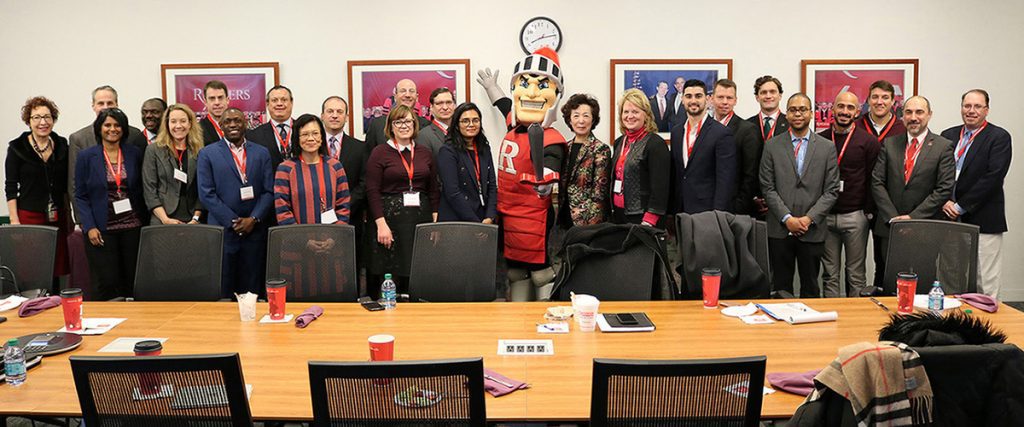Top 5 Full-Time MBA Programs: Australia

When it’s not engulfed in flames, Australia boasts a diversified economy and holds high scores across the board on the OECD Better Life Index. Australia is also advantageously located close to Asia, with some of the world’s fastest-growing economies.
Continue reading…Do Business Schools Have a Real Answer for Climate Change?

If relentless growth exists at odds with strategies dealing with climate change, how can business schools change the approach in a new decade?
Continue reading…Business and Climate Change, and More – Boston News

Let’s explore some of the most interesting stories that have emerged from Boston business schools this week.
Is It Up To Business To Save the Planet? – MIT Sloan Ideas Made to Matter
The MIT Sloan Management Review recently hosted a debate between engineering professor and Center for Transportation and Logistics director Yossi Sheffi and Winston Eco-Strategies founder Andrew Winston. In which, the two discussed whether for-profit companies should have any obligations to reverse climate change.
Winston says, “There’s always been the easy wins: cutting energy, lighting, retrofits, manufacturing efficiencies, everything under ‘lean is green.’ But now you’ve got the entire clean economy, renewable energy area where it is now cheaper fundamentally to buy renewable energy than fossil fuels pretty much everywhere in the world.”
Sheffi counters that many businesses are doing the bare minimum because the cost in jobs, standard of living, and dislocation don’t “justify the means.” He argued that fast food chains, for instance, need to adopt firmer moral stances like banning burgers, but for major company’s like McDonald’s, it would be economic suicide.
You can read more from the interview here and check out the full video below.
Pushing Back on Hacks – Sawyer Business School Blog
Data breaches among American corporations (see: Equifax) have become so ubiquitous that they hardly make compelling news anymore. According to Sawyer Business School, “inadequate in-house expertise is the top reason [companies] are likely to have a data breach.”
Sawyer’s Information Systems and Operations Management (ISOM) department was developed in response to the emerging opportunities for cybersecurity professionals. ISOM Professor Benjamin Ngugi helped assemble a Cybersecurity Beanpot hackathon this past October to give students a chance to experience the challenges for themselves firsthand by earning $10,000 in scholarship money to hack a website called ShadowBank.
Ngugi says, “For students to be good, they need to really think like hackers. They need to understand some of the tools and techniques that cybercriminals use to really be good in protection. The piece that is missing is a real website that they can go and hack.”
Security Innovation CEO and President Ed Adams, whose software security company sponsored the hackathon, writes, “ShadowBank is a safe playground where people can come and practice offensive and defensive cybersecurity skills. The point is to make the site as real as possible so that people can become familiar with how to protect a site in the real world.”
With the career opportunities in cybersecurity projected to explode in the coming years, Ngugi wants every Sawyer student to have a foundation in the subject.
“Whether you’re in marketing, accounting, taxation, finance, or healthcare, you need to understand cybersecurity fundamentals, data privacy, and required compliance laws and regulations.”
You can read the full article here.
Insurers’ Nearly Invisible Negotiated Rates Can Dramatically Affect Health Care Prices – Questrom School of Business News
Questrom School of Business Professor Keith Ericson co-authored a new working paper that finds that the “rates that insurers negotiate with hospitals for specific procedures” has led to “significant variation in prices at different health care providers” for procedures like MRIs and hip replacements.
Ericson says, “[Until now] we didn’t know that there was a lot of variation between insurers’ [negotiated prices] at the same hospital. Many are concerned about hospitals being high priced versus low priced. But people should also be concerned about insurers being high-priced versus low-priced. We should think about price transparency options.”
Read the complete working paper “How Important is Price Variation Between Health Insurers?“ co-authored with Penn’s Stuart V. Craig and Northwestern’s Amanda Starc.
You can read more from the Questrom article here.
Are Business Schools Equipped to Handle Climate Change?

The United Nations’ panel on climate change issued an alarming warning earlier this month. In order to avoid worsening events such as increasingly deadly storms and heat, the extinction of coral, and ever rising sea levels, member nations must act fast. Global leaders of business must pay particular attention to this warning, as the world economy will need to transform in order to support the vital decrease of carbon emissions.
New York News: How Climate Change is Effecting Your Mood, and More

Let’s explore some of the most interesting stories that have emerged from New York City business schools this week.
Climate Change Could Explain the Personality of Your Significant Other – CBS Newsroom
New research from Columbia Business School professor Adam Galinsky, along with Ph.D. candidate Jackson Lu has found a curious connection between the climates to which we grew accustomed as youngsters and our dispositions.
“Ambient temperature can shape the fundamental dimensions of personality. Our research reveals a connection between the ambient temperature that individuals were exposed to when they were young and their personality today. This finding can help explain the personality differences we observe in people of different regions.”
To further study to potential climate differences, the paper’s authors conducted research in two of the world’s most densely populated and geographically large countries: the United States and China. Lu explains the results:
“Clement [mild] temperatures encourage individuals to explore the outside environment, where social interactions and new experiences abound. Venturing outdoors and interacting with lots of people make people more agreeable, conscientious, emotionally stable, extraverted, and open to new experiences. But when the temperature is too hot or too cold, individuals are less likely to go outside to meet up with friends or to try new activities.”
Read more about the duo’s research here.
Launching a New Alumni Initiative – Rutgers Business School
The Rutgers Business School recently launched a new Corporate Alumni Advisory Council to strengthen the engagement between its current students and RBS alumni at marquee companies like PwC, Johnson & Johnson, and Wells Fargo.

Several members of the brand new Rutgers Business School Corporate Alumni Advisory Council / Photo via RBS
“This is a very exciting initiative with huge potential for networking, lifelong learning and connecting on so many levels that can benefit our alumni, their companies and Rutgers Business School,” said Andrea Cunnell, director of alumni and corporate engagement at Rutgers Business School.
Read more about the initiative here.
Campus Recruiting Hurts Older Workers, Suit Against PricewaterhouseCoopers Claims – Wall Street Journal
In an interview with Kelsey Gee of the Wall Street Journal, NYU Stern School of Business assistant professor Michael North says that as more and more Americans over the age of 65 delay their retirement, certain corporate biases are hurting them. The result of the bias has become the basis of a lawsuit against PricewaterhouseCoopers.
Gee explains:
Attorneys for the unsuccessful candidates—men who applied to PwC dozens of times in their late 40s and early 50s—aimed to convince San Francisco District Judge Jon Tigar on Tuesday that 14,000 older workers were similarly disadvantaged by the accounting firm’s system of finding applicants at university career fairs and school-affiliated job websites, over a four-year period.
You can read more about the lawsuit here.
For the Most Complex Technology Problems, Stevens Research Turns to Nature – Stevens Institute of Technology
Data science expert Dr. Amir H Gandomi, at the Stevens Institute of Technology School of Business, has used techniques from evolutionary computation to gain insight into large-scale optimization and data-mining problems, as well as supply chain management and customer engagement and interaction.
“When you have mathematical solutions to your problems, that’s great, but real-world problems are more complex — they’re nonlinear, mixed variables, large scale, sometimes black box. In these cases, these kinds of algorithms are flexible and adaptable enough to help you find answers.”
Read more about about Dr. Gandomi’s innovative research here.
MIT Sloan Lays Bare Potential Environmental Impact of Biofuel

By 2030, the EU hopes renewable energy will be, at a minimum, 35 percent of its entire energy consumption—a landmark goal is shared similarly among major economies like India and China. With global governments looking beyond traditional energy initiatives, the future of biofuel is as crucial as ever, according to MIT Sloan research.
Sloan Professor John Sterman explains, “Declaring that biofuels are carbon neutral, as the EU and others have done, erroneously assumes forest regrowth quickly and fully offsets the emissions from biofuel production and combustion.”
Sterman, along with Juliette Rooney-Varga, Director of the University of Massachusetts Lowell Climate Change Initiative, and Lori Siegel, Senior Modeler for the nonprofit Climate Interactive, published a new report, which argues, “burning wood pellets for power is worse than coal” and zero-carbon energy sources like solar and wind are “the safest, easiest, and cheapest ways to cut greenhouse gas emissions.”
The report explains, “While biofuel might sound good on paper, instead of using fossil fuels to inject eons-old carbon into the air, it recycles carbon from the atmosphere—in practice the research points to a much more negative impact on the environment.”
“The neutrality assumption is not valid because it ignores the transient but decades to centuries-long increase in carbon dioxide caused by biofuels. Because combustion and processing efficiencies for wood are less than coal, the immediate impact of substituting wood for coal is an increase in atmospheric (carbon dioxide) relative to coal. The payback time for this carbon debt ranges from 44-104 years after clear-cut, depending on forest type—assuming the land remains forest.”
Sterman elaborates, “It’s like an investment in which you give your bank $1,000 today. They promise to pay you back, but only over 80 years, and only if they don’t go out of business first or decide there’s something else they’d rather spend your money on.”
He concludes, “In the same way, it’s better to keep the trees on the land and keep all that carbon out of the atmosphere. You’re better off if you keep your money.”
